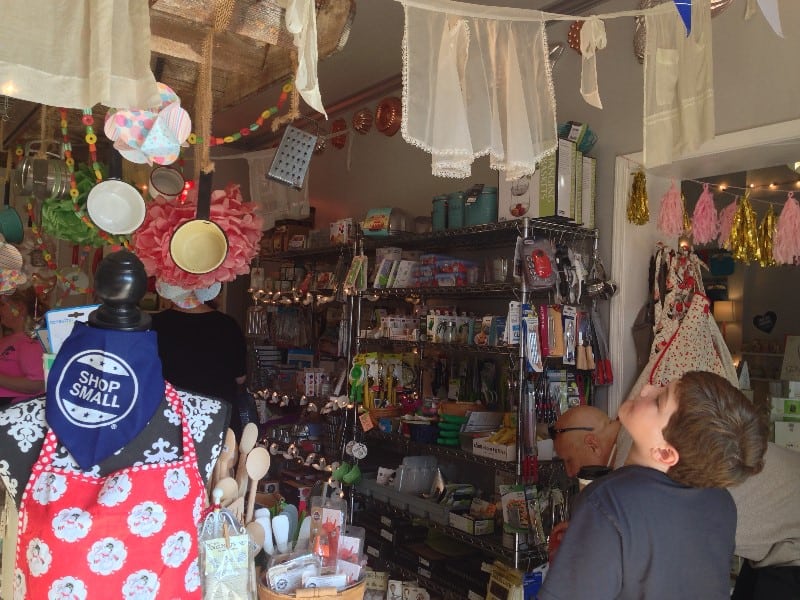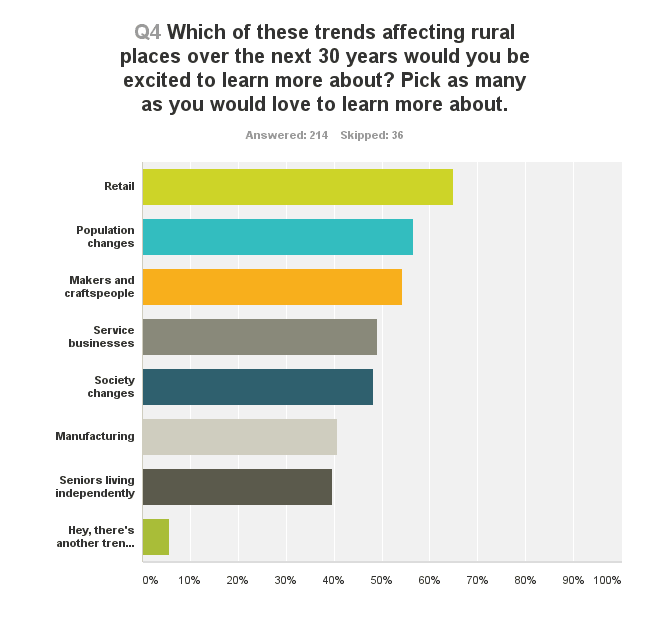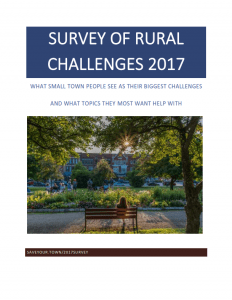
Rural small business owners cited challenges with being open later hours, marketing and finding help. This small business in Galveston, Texas, is cooperating in the national Shop Small Saturday marketing. Photo by Becky McCray.
By Becky McCray
When you ask small town people what challenges they want help with, the responses provide an interesting insight into rural areas today.
SaveYour.Town and SmallBizSurvival.com conducted a survey among subscribers and visitors to their sites during 2017, receiving 250 individual responses. Participants included 215 from the USA, 25 from Canada, and 10 from other international locations. The results were compared with a similar survey in 2015 that received 227 responses.
Rural Community Challenges
Top five concerns at the community-wide level were mostly the same in 2017 as 2015.
- Downtown is dead
- Losing young people
- No one shops in town
- Missing out on tourism opportunities
- Need new residents
The top four choices are the same as in the 2015 results, but with the first two switched in position. The fifth most-chosen answer, “Need new residents,” rose two slots from seventh position in the 2015 results. The number five choice in 2015 was “No businesses in town,” which dropped one position to sixth in 2017.
Small-Town Business Owner Challenges
Over ¾ of those surveyed identified themselves as current or prospective small business owners. Top concerns among business owners were mostly the same in 2017 as 2015.
- Tried opening later hours without success
- Marketing isn’t working
- Need help but cannot hire
- People want to pick their brain for free
- Need a usable building
The top four choices are the same as in the 2015 survey, but with choices three and four switched in position. The fifth most-chosen challenge, “Need a usable building,” rose two slots from seventh position in the 2015 results. The number five choice in 2015 was “Need an idea to start a business,” which fell to ninth position this year.
Rural Trends of Interest
Over 85% of participants chose among the coming trends of most interest to them. This was a new question on the 2017 survey.
The top trends garnering attention were:
- Rural retail trends (omni-channel, drone delivery, consumer shifts)
- Rural population changes
- Trends affecting rural makers and craftspeople
- Rural service business trends (contingent workers, remote work)
- Changes to rural society (populations, shifts in the center of power, automation)
Other Rural Challenges
Taking the structured and open-ended responses together, several themes emerged where the surveyed rural people most feel the need for help.
Conflicts and negativity hinder progress
- Lack of cooperation, apathy, negativity and resistance to change among local leaders and residents were the most commonly-mentioned challenges, appearing in 22 of the open-ended responses
- Conflicts between different groups and cultures were mentioned, including conflicts between age groups, long-time residents conflicting with new residents, different religious and faith communities, and diverse racial groups
- Social isolation caused by conflicts between groups and unique local issues were mentioned in three open-ended responses
Uncertainty around population
- Losing young people and a need to recruit new residents both scored in the top five of the choices this year
- Decline in population and aging population both were mentioned in the open-ended responses
- Lack of volunteers was also mentioned, with people saying they had more ideas and projects than people to accomplish them
- Workforce shortages were mentioned in five open-ended responses
Rural communities are focused on downtown
- Downtown business district issues were commonly mentioned, including the types of businesses, need for business support, drawing residents downtown for shopping and activities, and competition with online and big chain retail competitors
Rural Solutions
Even though the survey focused on identifying rural challenges, positive responses focused on the future, creating their own solutions and moving forward.
Rural people are focused on creating their own solutions
- Many people identified local trends they felt they could take better advantage of, including tourism, accommodations, youth retention and family-friendly activities
Lack of people is more of a limiting factor than lack of funding
- There are so many rural projects and activities that a shortage of volunteers emerges
- Over a quarter of all the people mentioned the lack of volunteers as a challenge
- Only two people brought up a lack of funding
There’s more interest in makers than in manufacturers
- When asked about trends 30 years into the future, more people expressed an interest in trends for makers and craftspeople than for manufacturing
What the Survey DIDN’T say
The responses from rural people broke down some prevalent small-town stereotypes.
Small towns aren’t interested in recruiting outside businesses
- While many local governments and economic development professionals are focusing on recruiting outside businesses, the need for that was not reflected in this survey
- No one mentioned needing to recruit a national chain or an outside franchise business to improve their town
- Only two respondents mentioned a business gap, or a specific business they felt their community or downtown needed to develop through local entrepreneurs
Rural people are not waiting for factory jobs to come back
- There was not a single mention of the return of factories in responses to this survey
- Many responses focused on growing local entrepreneurship
- Five times as many people mentioned a lack of available workforce than mentioned lack of jobs
Rural community challenges aren’t as poverty- and crisis-driven as you might think
- While national media coverage of rural areas often focuses on towns that have suffered the loss of a major employer or industry, the least-selected choice for challenges (under 7%) was that their town had suffered “a terrible blow” such as the loss of a factory
- Although rural poverty and drug problems are another common media theme, only three responses mentioned poverty, crime or drugs
Small town business challenges are more about buildings and marketing than about loans
- Although a lack of small business lending is often cited as holding back small businesses, more people cited trouble finding a usable building than trouble finding a loan, and this was also true in the 2015 survey results
- It’s not true that everyone knows everyone in a small town, as both top small business challenges related to marketing
Housing shortages didn’t get many mentions
- Although housing is a major focus issue for governments in some rural US regions, only three responses to this survey mentioned a shortage of usable housing
The Write-In Candidates
When given open space to mention any other challenges, the surveyed rural people shared many additional areas where they need help.
- Help how do we counter general apathy and build a greater sense of community across the entire community?
- As more young families decide to “go rural”, will the old communities welcome and open up to them? Can they help revive old or dying facilities and improve access to daily needs and necessities? How can young doctors and teachers be enticed to settling in rural areas?
- Our municipal leaders have PMS: they’re Pale, Male and Stale. They are risk averse, penny-pinching and, unwittingly perhaps, make their jobs look difficult which repels young people and business owners from running for election.
- We have great ideas to help our town/county, but not the human capacity to move them forward.
- Maybe the answer is to differentiate by giving rural consumers the “old” shopping experience, BUT doing it so well that the alternatives aren’t so attractive.
- How do I attract good employees for low-level jobs?
- Loss of transportation and loss of medical services in rural areas. What are alternatives?
- Demographic shifts, the creative class, “rural by choice”… finding a community niche in the business clusters that the entire region will depend upon, appropriate housing (we have affordable housing in spades)…..all of these are challenges to making our communities attractive enough for new residents and to have our own millennials return home. There is no single magic bullet. There are many threads to weave.*
- Knowing how to filter the media reports on government reports about changes in business and taxes and how it effects the shopping consumers, along with entrepreneurs who may want to start up in business. In other words…how can we prepare to change with the unknown?
- Start the talk about #BrainGain. I hated when they coined #braindrain when I was in high school. Let’s talk about the influx that is coming and give more momentum to the movement. I also hate it when people talk about their communities housing problem. It is a housing opportunity to the entrepreneur that will fix it.
*edited for brevity and clarity
Survey Details and Recommended Action Steps for Rural Communities
More details on the survey and methodology are available on our Survey Page. A set of action steps for communities created in response to this survey data is also available at no cost to subscribers.












